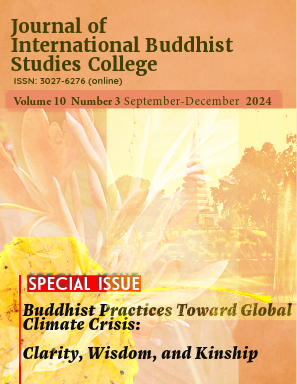Exploring Buddhist Perspectives on Consciousness, Compassion, and Interconnectedness: Insights from Human Sense
Main Article Content
Abstract
This article explores Buddhism's rich framework for understanding human consciousness, compassion, and interconnectedness, providing valuable insights in the face of modern-day challenges. Grounded in ancient wisdom, Buddhist teachings transcend time and illuminate the core of human experience. By examining the role of human sense perception, the article illustrates how mindfulness practices empower individuals to navigate life's impermanence, fostering compassion and a deep sense of interconnected responsibility. These practices enable individuals to make ethical decisions rooted in non-harm and altruism, promoting harmony and well-being for all beings.
Buddhism stresses the interdependence of all phenomena, imparting principles beyond personal transformation to inform ethical conduct and societal harmony. As individuals embrace mindfulness, compassion, and interconnectedness in their daily lives, they contribute to creating more compassionate communities and actively address critical global challenges, such as environmental degradation and social inequality. By recognizing the interconnectedness of human and ecological systems, Buddhist teachings advocate for ecological responsibility and sustainable living practices that serve both current and future generations.
More than merely a religion, Buddhism serves as a treasure trove of timeless insights into the human condition, offering practical tools for personal development and collective well-being. By integrating mindfulness practices, compassionate actions, and a profound understanding of interconnectedness, individuals can navigate the complexities of modern life with wisdom and empathy. Ultimately, this exploration affirms the relevance of Buddhist perspectives in cultivating a more peaceful, just, and sustainable world, emphasizing the transformative potential of its teachings for both individuals and societies.
Article Details
The Journal of TCI is licensed under a Creative Commons Attribution-NonCommercial-NoDerivatives 4.0 International (CC BY-NC-ND 4.0) licence unless otherwise stated. Please read our Policies page for more information on Open Access, copyright and permissions.
References
Anālayo. (2013). Satipaṭṭhāna: The direct path to realization. Windhorse Publications.
Bhikkhu Bodhi. (2021). The Great Discourse on Causation: The Mahānidāna Sutta and Its Commentaries. Pariyatti.
Dalai Lama, & Cutler, H. C. (2009). The art of happiness: A handbook for living. Penguin.
Darlington, S. M. (2012). The ordination of a tree: The Thai Buddhist environmental movement. SUNY Press.
Bhante Gunaratana. (2011). Mindfulness in plain English. Wisdom Publications.
Callicott, J. B. (2019). Conservation of Biological Resources: Responsibility to Nature and Future Generations. In D.J. Decker (Ed.). Challenges in the Conservation of Biological Resources, (pp. 33-42). Routledge.
Gyatso, T. (2015). A Policy of Kindness: An Anthology of Writings by and about the Dalai Lama. Snow Lion Publications.
Dalai Lama. (2006). The universe in a single atom: The convergence of science and spirituality. Harmony.
Hahn, T. N. (1999). The Heart of the Buddhas Teaching Transforming Suffering into Peace, Joy and Liberation: The Four Noble Truths, the Noble Eightfold Path, and Other Basic Buddhist Teachings. Broadway Books.
Hanh, T. N. (2017). The Other Shore: A New Translation of the Heart Sutra with Commentaries. Parallax Press.
Harris, I. (1995). Buddhist Environmental Ethics and Detraditionalization: The Case of EcoBuddhism. Religion, 25(3), 199-211.
Harvey, P. (2000). An introduction to Buddhist ethics: Foundations, values and issues. Cambridge University Press.
Hofmann, S. G., Grossman, P., & Hinton, D. E. (2011). Loving-kindness and compassion meditation: Potential for psychological interventions. Clinical Psychology Review, 31(7), 1126-1132.
Hutcherson, C. A., Seppala, E. M., & Gross, J. J. (2008). Loving-kindness meditation increases social connectedness. Emotion, 8(5), 720-724.
Kabilsingh, C. (1998). Thai women in Buddhism. Parallax Press.
Kaza, S. (2008). Mindfully Green: A Personal and Spiritual Guide to Whole Earth Thinking. Shambhala Publications.
Keng, S. L., Smoski, M. J., & Robins, C. J. (2011). Effects of mindfulness on psychological health: A review of empirical studies. Clinical Psychology Review, 31(6), 1041-1056.
Keown, D. (2005). Buddhist ethics: A very short introduction. Oxford University Press.
Klimecki, O. M., Leiberg, S., Lamm, C., & Singer, T. (2012). Functional neural plasticity and associated changes in positive affect after compassion training. Cerebral Cortex, 23(7), 1552-1561.
Kok, B. E., Coffey, K. A., Cohn, M. A., Catalino, L. I., Vacharkulksemsuk, T., Algoe, S. B., Brantley, M. & Fredrickson, B. L. (2013). How positive emotions build physical health: Perceived positive social connections account for the upward spiral between positive emotions and vagal tone. Psychological Science, 24(7), 1123-1132.
Krairiksh, P. (1982). The concept of Dasavidha-rājadhamma in Thai political history. The Journal of the Siam Society, 70(1), 25–36.
Rahula, W. (1974). What the Buddha taught. Grove Press.
Salzberg, S. (1995). Loving-kindness: The revolutionary art of happiness. Shambhala.
Segall, S. Z., & Kristeller, J. L. (2023). Positive psychology and Buddhism. In E. B. Davis, E. L. Worthington Jr, & S. A. Schnitker. (Eds.). Handbook of positive psychology, religion, and spirituality (pp. 211-226). Springer Nature. https://doi.org/10.1007/978-3-031-10274-5_14
Snyder, G. (2002). The Practice of the Wild. Shoemaker & Hoard.
Swearer, D. K. (1995). The Buddhist world of Southeast Asia. State University of New York Press.
Tucker, M. E., & Williams, D. R. (1997). Buddhism and Ecology: The Interconnection of Dharma and Deeds. Harvard University Press.
Wongchantra, P., Thongthew, S., & Promphakping, B. (2017). The role of mindfulness in Thai education. Journal of Asian Education, 18(2), 123-138.


